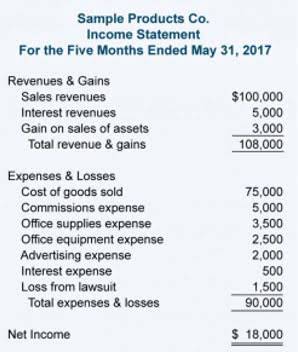
Alternatively, FOB destination places the delivery responsibility on the seller. The seller maintains ownership of the goods until they are delivered, and once they’re delivered, the buyer assumes ownership. For example, assume Company XYZ in the U.S. buys computers from a supplier in China and signs a FOB destination agreement.
FOB shipping point always benefits the seller
When it is indicated as “FOB Origin,” it means that the transfer occurs at the seller’s shipping dock when the goods are safely on board the ship. FOB is an acronym for Free on Board, and indicates whether the supplier or the customer will pay shipping expenses. Also, the type of FOB shows which party takes legal responsibility for the goods being shipped, and at what point during transport that responsibility is transferred. The type of FOB to be used is typically designated in a customer’s purchase order, and is also stated on the supplier’s invoice to the customer. However, in FOB agreements, the seller transfers responsibility to the buyer as soon as the goods leave the seller’s location (FOB shipping point) or buyer’s location (FOB destination). For international trade, contracts establish and outline provisions–such as the FOB designation, payment terms, time and place of delivery–for shipments that are being made out of the country.
FOB Freight Prepaid and Added

Chartered accountant Michael Brown is the founder and CEO of Double Entry Bookkeeping. He has worked as an accountant and consultant for more than 25 years and has built financial models for all types of industries. He has been the CFO or controller of both small and medium sized companies and has run small businesses of his own. He has been a manager and an auditor with Deloitte, a big 4 accountancy firm, and holds a degree from Loughborough University. A variation on FOB shipping point is were the seller for convenience prepays the shipping cost and recovers this from the buyer at a later date.
What is FOB Shipping Point?
According to the FOB terms, the more frequently a company orders inventory, the higher the shipping and insurance charges will be. Moreover, the FOB type also specifies who is legally accountable for the goods being shipped and when that responsibility is transferred during transportation. Since the seller retains ownership of the items throughout the transportation damage period, the seller should file any claims fob shipping point with the insurance company. Since the computers were shipped FOB destination, Dell (the seller) is responsible for the goods during the shipping process. The goods were never delivered to Don, so Dell is fully responsible for the computer damages and would have to file a claim with its insurance company. They can’t decide the shipping company, the route the company takes, or when and how the shipment is delivered.
Risks and Disadvantages of FOB Destination
- Likewise, the buyer won’t officially add the goods to its inventory until they arrive and are inspected.
- FAS stands for “free alongside ship” and is often used for bulk cargo transactions.
- FOB (Free On Board) means the seller’s responsibilities end once the goods reach the ship’s rail, so the buyer takes over.
- Until the items have arrived at the buyer’s location, the seller retains legal responsibility for them.
- If the terms include the phrase “FOB Origin, freight collect,” the buyer handles freight charges.
- The FOB term refers to the moment where a business that is shipping products is no longer responsible for the items.
- FOB Destination refers to when the vendor’s liability for and custody of the products passes to the buyer when the goods arrive in great condition at the buyer’s location.
If the goods are damaged in transit, the buyer should file a claim with the insurance carrier, since the buyer has title to the goods during the period when the goods were damaged. Conversely, the seller does not have title during this period, and so should not file a claim. If your business buys or sells goods overseas, choosing the best Incoterms® rule for your cargo can sometimes be confusing, especially if you’re new to the world of overseas freight shipping.
- To account for these expenses, sellers may need to increase the final price for the buyer.
- Furthermore, the buyer benefits far more from FOB destinations than the vendor.
- For example, assume Company XYZ in the U.S. buys computers from a supplier in China and signs a FOB destination agreement.
- Ideally, the seller pays the freight charges to a major port or other shipping destination and the buyer pays the transport costs from the warehouse to his store or vendors.
- To facilitate a smooth transfer of goods from the vendor to the client, each entity should have a solid grasp of free on board (FOB).
- The goods were never delivered to Don, so Dell is fully responsible for the computer damages and would have to file a claim with its insurance company.
- Since the computers were shipped FOB destination, Dell (the seller) is responsible for the goods during the shipping process.
What is the difference between a bill and an invoice?
Upholding and adhering to International Commercial Terms is critical to international trade and commerce and to individuals as well. On the flip side, FOB arrangements tend to be more cost-effective for buyers and give them more control over the timing and price of shipments. Sellers like FOB shipping point arrangements because they relieve them of the responsibility of the cost and liability of shipping goods. If the goods fell overboard at that point or were damaged, they became the buyer’s loss, not the seller’s. The difference between the two designations can be a big deal for businesses because it indicates which party is responsible for the costs if a shipment is lost, stolen, or damaged.
- When products are received at the location the customer specifies, ownership passes from the seller to the buyer.
- Simultaneously, while the treadmills have not yet been delivered, the buyer has now officially taken responsibility for the goods.
- CIF agreements cut down the need for buyers to take care of logistics in areas where they may not have experience, so all they need to do is simply take possession of the shipment once it arrives.
- Instead, the manufacturer retains ownership of the equipment until it’s delivered to the buyer.
- They are among the most common of the 11 international commerce terms (Incoterms), which were established by the International Chamber of Commerce (ICC) in 1936.
- FOB Shipping Point means that the seller transfers ownership of the goods sold at the point of origin, when the items leave the seller’s warehouse.
Types of FOB Contracts
While FOB shipping point does transfer risk to the buyer, it may affect a seller’s reputation and sales conversion rate. Shipping costs are reduced, but fewer buyers are willing to accept shipping point terms, especially on large or fragile orders. If you agree to FOB shipping point terms, remember to factor in the costs of shipping and import taxes to your location when negotiating price.

How to Factor in Inventory Costs
- Conversely, the seller does not have title during this period, and so should not file a claim.
- FOB shipping point, or FOB origin, means the title and responsibility for goods transfer from the seller to the buyer once the goods are placed on a delivery vehicle.
- If the products are FOB invoice shipping points, then the buyer will mark them as sold.
- FOB shipping point terms and FOB destination terms are two of several international commercial terms (“Incoterms”) published by the International Chamber of Commerce (ICC).
- To simplify and expedite the process of winning clients’ business and getting paid, use Deskera’s proven software solutions for businesses and free templates.
- FOB destination point refers to a product sold to a customer after it arrives at the buyer’s destination.
CIF is an expense paid by the seller to cover the freight costs, insurance, and shipping of a buyer’s order while being transported to the buyer’s destination. Free on board (FOB), sometimes known as “freight on board,” is a common agreement for international shipping. It indicates the point when the costs and risks of shipping shifts from the seller to the buyer. FOB shipping point (aka FOB origin) means that the title and responsibility of goods transfer from the seller to the buyer at the point of shipping. FOB destination means that the title and responsibility are transferred at the final shipping destination. International commercial laws standardize the shipment and transportation of goods.

